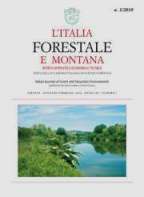Published
2013-05-06
Keywords
- Convention on Biological Diversity,
- Pan-European Biological and Landscape,
- Diversity Strategy,
- forest management on a natural basis,
- systemic silviculture
Abstract
During the last decades adapting silvicultural systems to a changed society, increasingly aware of the multifunctional role of forests, was a much debated issue in Italy. Stemming from this discussion is the systemic silviculture concept, an adaptive forest management tool aimed at cultivating the forest as a self-organizing system and focusing on sustaining its functional efficiency as the best way to enhance forest multi-functionality. This concept has much connection with the Ecosystem Approach defined by the Convention on Biological Diversity as a strategy for the integrated management of land, water and living resources that promotes conservation and sustainable use in an equitable way. In the following a case study is presented where the principles of systemic silviculture are implemented in the management of private and common forest properties in the Serre mountains of the Calabria Region (Italy); relationships with the Ecosystem Approach principles are analyzed in order to evaluate to what extent systemic silviculture can be regarded as a means to bring the EA to the implementation level.


